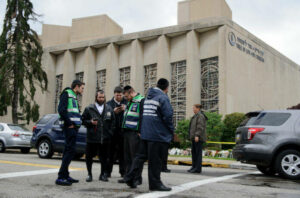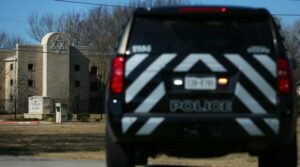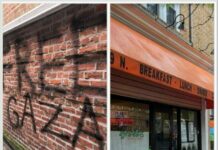
“Since Pittsburgh.” It’s a reference you hear a lot these days from Jewish community leaders.
“Since Pittsburgh,” we have locks on our doors. “Since Pittsburgh,” we have had alarm systems. “Since Pittsburgh,” we position armed guards outside our Shabbat services.
The reference is to the tragic Tree of Life Synagogue complex (in Pittsburgh) shooting on Oct. 27, 2018. That day, a man entered the synagogue and shot and killed 11 worshippers during a Shabbat morning service. It was the deadliest antisemitic act in United States history.
It also shocked Philadelphia-area Jewish communities into putting measures in place. Many synagogues acted on their own. But by 2021, the Jewish Federation of Greater Philadelphia was distributing security grants from the Jewish Federations of North America’s $54 million LiveSecure program. And earlier this year, the Jewish Federation of Southern New Jersey launched a $750,000 security network in 11 Garden State counties and Delaware.
Going into the High Holidays, local Jewish leaders are confident in their security measures. That’s because since Pittsburgh they have worked.
“Thank God,” said multiple rabbis when interviewed for this story.
Since Rosh Hashanah and Yom Kippur are the biggest days on the Jewish calendar, they draw the biggest crowds to synagogues. Therefore, rabbis, presidents and executive directors put more security in place on the High Holidays than they do the rest of the year.
Fortifications take different forms at different shuls. It depends on the meeting place and the size of the crowd.
“Since Pittsburgh,” Reform Congregation Keneseth Israel in Elkins Park has had a full-time guard, according to Rabbi Benjamin David. But for High Holiday services, that guard becomes part of a team of guards and local police officers.
“This is the reality today,” David said.
“Since Pittsburgh,” the Conservative Beth Israel Congregation of Chester County makes members sign up for High Holiday gatherings, according to Rabbi Jon Cutler. They also notify the police chief to make sure he sends officers out and positions congregants at the door to check people in.
“Pre-Pittsburgh, our doors were open,” Cutler said.

But since Pittsburgh, the Conservative Congregation Brothers of Israel in Newtown has hired a security guard for “just about every event,” Rabbi Aaron Gaber said. For Rosh Hashanah and Yom Kippur, the shul brings in a team of guards and ushers. CBOI leaders will also review their security procedures with the Newtown Township Police Department.
“I’m confident that we’re doing everything we can,” the rabbi said.
Main Line Reform Temple-Beth Elohim in Wynnewood issued tickets for High Holiday services before Pittsburgh, according to Rabbi Geri Newburge. But since Pittsburgh, members need to show those tickets to ushers at the main entrance as they walk in. If you forget your ticket, you go to a table to have your name and identity checked.
“Everyone feels this is our reality,” Newburge said.
Since Pittsburgh and the Poway synagogue shooting at a Chabad house in California in April 2019, the Lubavitch of Yardley has had an armed guard at all prayer sessions, according to Rabbi Zalman Blecher. But two come for High Holiday services. Since Lubavitch members observe Rosh Hashanah and Yom Kippur in the backyard of the shul’s rented home on Yardley Newtown Road, Blecher also gets the Lower Makefield Township Police Department to send an officer to keep watch.
“It is sad and unfortunate that things have come this way,” Blecher said. “But I’m happy that we have the resources to allay those concerns.”
And since Pittsburgh, even smaller congregations with less formal gathering places must fortify themselves.
YPC Shari-Eli is a group of about 10 people that meets in a South Philadelphia rowhome. Its leaders expect 35 people to attend High Holiday services, so they plan to notify the local office of the Philadelphia Police Department. Or Zarua on the Main Line consists of about 80 empty nesters who gather in the Old Haverford Friends Meetinghouse. Rabbi Shelly Barnathan said they reach out to the Haverford Township Police Department to send an officer for Rosh Hashanah and Yom Kippur.
Rabbi Isaac Leizerowski leads one of the few Jewish communities in the region, the Orthodox Congregation Beth Midrash HaRav B’Nai Jacob in Northeast Philadelphia, that has not implemented security measures. His neighborhood community worships in the basement of a duplex.
“I think to myself many times, ‘I don’t have those automatic locking doors. It’s time to do it,’” Leizerowski said. “We’re not a high-profile synagogue. It gives you a false sense of security. On Shabbos morning, there’s a parade of people coming in and there’s a parade of people that go walking out.”






